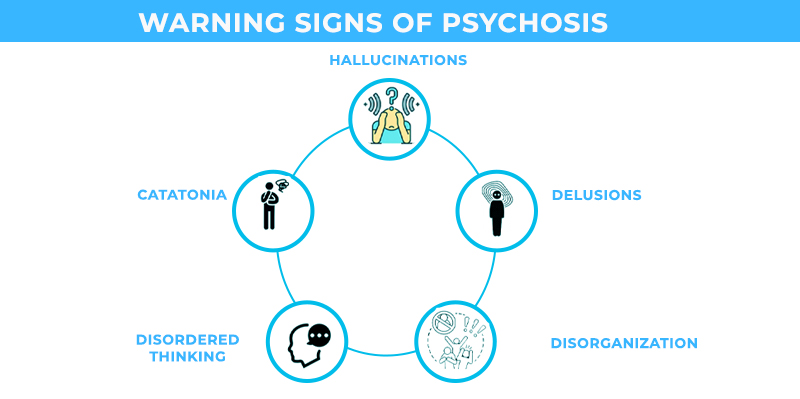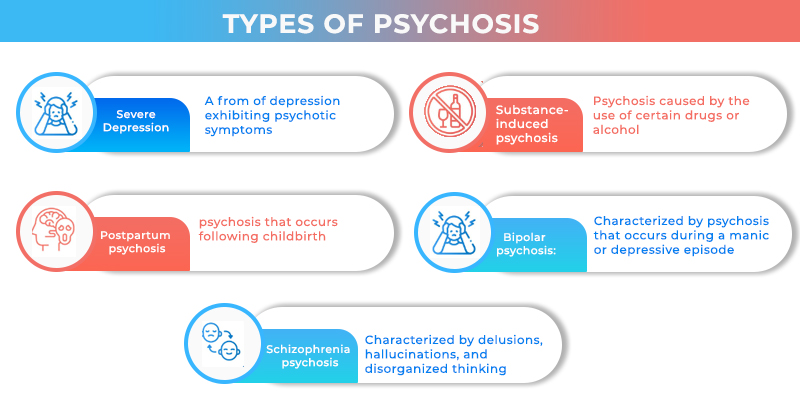Psychosis is a mental health disorder that causes disruptions in the way an individual thinks, perceives reality, and behaves. It can manifest itself in several different ways and can be caused by a variety of underlying factors.
Let’s explore more about psychosis, including the warning signs, causes, and types.
What Is Psychosis?
Psychosis is a mental health disorder characterized by delusions, hallucinations, and other cognitive disturbances. It can be caused by a variety of underlying medical or psychological conditions, such as schizophrenia, bipolar disorder, depression, drug use, or head trauma. Severe psychosis can lead to disruptions in an individual’s thoughts, perceptions of reality, and behavior.
Warning Signs of Psychosis:

The warning signs of psychosis vary from person to person, but some common signs Include:
- Hearing voices or seeing things that aren’t there
- Extreme paranoia and suspiciousness
- Confused thinking, difficulty concentrating, and poor memory
- Difficulty understanding the consequences of their behavior
- Disorganized speech and strange behaviors
- Feeling disconnected from reality
- Making up stories or beliefs about their identity
- Difficulty understanding what is real and what isn’t real
If you notice any of these signs in yourself or someone else, it is important to seek help from a mental health professional.
Causes:
Psychosis can be caused by any number of underlying medical or psychological conditions. Common causes of this disorder include:
- Traumatic brain injury
- Substance abuse
- Schizophrenia
- Bipolar disorder
- Depression and anxiety disorders
- Postpartum psychosis
It is important to understand the underlying cause of psychosis before attempting to treat it.
Types of psychosis:

There are several different types of psychosis, each with its own set of symptoms and causes. The most common types include:
- Schizophrenia psychosis: characterized by delusions, hallucinations, and disorganized thinking
- Bipolar psychosis: characterized by psychosis that occurs during a manic or depressive episode
- Substance-induced psychosis: psychosis caused by the use of certain drugs or alcohol
- Postpartum psychosis: psychosis that occurs following childbirth
Psychosis is a serious mental health disorder, and it is important to seek help if you or someone else is exhibiting the warning signs listed above. Furthermore, with proper treatment, psychosis can be managed and individuals can lead healthy and successful lives.
Treatment:
Treatment for psychosis typically includes a combination of medications and psychotherapy. Medications are often used to reduce symptoms such as hallucinations and delusions, while psychotherapy helps to address underlying issues and improve the individual’s cognitive functioning. A healthcare professional will be able to determine the best treatment plan for an individual based on their unique situation.
Is it treatable?
Yes, psychosis is treatable. Treatment for psychosis typically involves a combination of medication and therapy. Antipsychotic medications can help reduce symptoms of psychosis, while therapy can help individuals manage their symptoms and understand their condition. It is important to talk to a mental health professional about the best treatment options for psychosis.
FAQs
What do Doctors say about this disorder?
Doctors agree that psychosis is a serious mental disorder, but they also emphasize the importance of seeking help as soon as possible. Early intervention can be instrumental in helping individuals manage psychosis, and can often prevent the disorder from worsening over time. Doctors also emphasize the importance of finding a qualified mental health professional who can provide the best treatment for psychosis.
Can psychosis be treated/managed without medication?
Yes, psychosis can be treated and managed without medication. Non-medication treatments for psychosis include psychotherapy, cognitive behavioral therapy, family therapy, and lifestyle changes. Moreover, these treatments can help individuals manage psychosis symptoms, understand their condition, and build coping skills for dealing with psychosis.
What is the difference between schizophrenia and psychosis?
Schizophrenia and psychosis are both mental health disorders, but they have different symptoms and causes. Schizophrenia is a chronic disorder characterized by psychosis, delusions, and hallucinations. Psychosis is a symptom of schizophrenia, but it can also be caused by other medical or psychological conditions. It is important for you to understand the differences between psychosis and schizophrenia so that the right treatment can be chosen.
Does isolation cause psychosis?
No, isolation does not directly cause psychosis. However, research has found that people who experience extended periods of social isolation may be more at risk of developing psychosis. Social isolation can also worsen psychosis symptoms, so it is important for individuals with psychosis to engage in activities that foster social connection and mental well-being.
